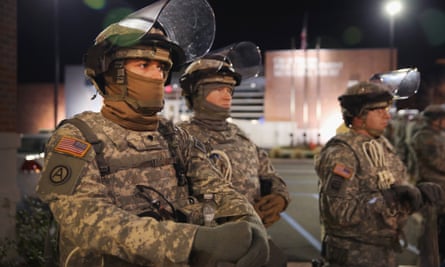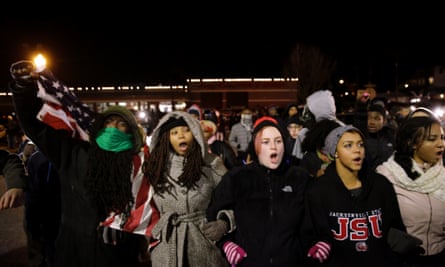It was 10.08pm when Barack Obama stood at a lectern in the White House and said: “We have made enormous progress in race relations over the course of the past several decades. I’ve witnessed that in my own life. And to deny that progress I think is to deny America’s capacity for change.”
At that very moment, 800 miles west, hundreds of young black teenagers were trying to overturn a police car in a suburb that has come to represent the lack of racial progress in America. It was the start of a night of raw anger in Ferguson, Missouri, that by the morning would be considered the worst race-related disturbances since Los Angeles riots in 1992.
By Tuesday 7pm, on that same stretch of road where teenagers attacked the police car, there was a scene reminiscent of the 1960s civil rights movement.

Mostly white National Guardsmen in military fatigues stood in a line behind shields, protecting a police station that has been the focal point of predominantly black protests.
For many in Ferguson, the decision not to indict police officer Darren Wilson over the killing of the unarmed black 18-year-old Michael Brown was evidence that, six years into the presidency of the first black president, America remains a divided nation.
Many African Americans interviewed by the Guardian said Obama’s race partly explained his impotency as president; his inability to influence events from Washington to the streets of Ferguson.
They argued that as a black president the odds were stacked against him; others in the power structure, they argued, are determined to thwart him.
On some level, they said, Obama could relate to their frustrations. Yet nearly all of those interviewed said the president’s empathy only goes so far – and not, they said, far enough.
At dusk, a few National Guard soldiers were also assembling two miles north-east of the police station. They were huddled around an armoured personnel vehicle in a strip mall off West Florissant Avenue, the scene of the worst violence in Monday.
All of the soldiers were white. Nearly all of the shoppers walking past were black.
When they needed to use the bathroom, the army reservists, in full protective gear, walked in pairs to use the facilities inside Save A Lot.

The had to walk past the discount supermarket’s boarded up windows which had been sprayed with a message for looters: ‘Black Owned’.
Susie Jones, a 57-year-old grandmother, was sat in her car smoking her cigarette. She shook her head in disbelief at the image of armed soldiers on the streets of the St Louis suburb.
“These people just treat us like we’re nobody,” she said. “They do – always have. I don’t care how nice we try to be with them. Police just do what the hell they want.”
Asked about Obama, Jones was effusive, but careful to stress that the Hawaii-born Harvard graduate had experienced a very different upbringing to that lived by people in Ferguson.
“He had a silver platter. He didn’t miss out on nothing,” she said. “But I think he was still trying to do what he could. I really feel he knows what us as black people go through.”
That said, even the occupant of the White House was ultimately powerless without the support of the rest of the predominantly white political establishment.
She said Congress should “move out of the way” to allow the president to do more than just give powerful speeches. “He ain’t shit,” she said of Obama. “His words mean nothing.”
That sentiment was partly echoed by Johnetta Elzie, a 25-year-old protest leader. “I think he’s very aware of how racism works,” she said “Everyday he’s reminded he’s a black man in the White House. The people who oppose him do a good job of subtly reminding him it is because of the colour of his skin.”
She added that the president is less able to relate to the restraints of “social class and economic issues” that hamper poorer communities in the St Louis suburbs.
Close observers of the president say he has always had a complicated relationship with race.
Striving to appear as a unifying, some would claim even post-racial head of state, Obama skirted race and identity issues for much of his first term of office.
That changed last year, in the wake of the decision by a Florida jury to acquit George Zimmerman over the death of teenager Trayvon Martin. In his most candid remarks about racial discrimination of his presidency, Obama decried the daily stereotyping of young black men and said “Trayvon Martin could have been me 35 years ago”.
The president has charted a more cautious path since the death of Brown. Speaking after the decision not to indict Wilson on Monday, he said that while there had been improvements in race relations in the US “the situation in Ferguson speaks to broader challenges that we still face as a nation”.
“The fact is, in too many parts of this country, a deep distrust exists between law enforcement and communities of colour,” Obama said. “Some of this is the result of the legacy of racial discrimination in this country.”
Yet the limits of presidential influence were plain to see. Just as Obama was acknowledging the grievances of protesters but imploring them to refrain from throwing bottles, smashing car windows and vandalising property, TV cameras were recording hundreds of angry demonstrators doing precisely that.
By Tuesday the president’s rhetoric had hardened considerably. He called on those responsible for violence to be prosecuted and said: “To those who think that what happened in Ferguson is an excuse for violence, I do not have any sympathy for that.”
Steve Moore, the 49-year-old owner of Celebrity Soul Food restaurant, which was looted back in August, said the pressure Obama faces in Washington from his political critics was indicative of the experiences of ordinary people.
“If you have a commander-in-chief, in a high position like that, facing racial profiling and slander on a daily basis, what do you think it is like for simple, every day, law-abiding African Americans?”
But African Americans, he said, sometimes feel that Obama just stops short of supporting their interests. He pointed out how Obama, only last week, gave an impassioned and emotional plea for American to accept mostly Hispanic undocumented migrants.
“He’s doing it for the Mexicans,” he said. He added that he believed in solidarity across the ethnic divide but felt black Americans faced particular grievances Obama should be able to relate to.
It is not only Obama’s race that leads people to think he would be well-placed to speak to issues of race and poverty in America. After graduating, Obama worked for three years as community organiser in deprived black neighbourhoods on Chicago’s south side.
He is also widely considered a progressive, left-leaning Democrat with tremendous skills of oratory, a president who – even his critics concede – has the power to inspire.
White House officials are actively weighing the merits of a presidential visit to Ferguson.
Mark KeceBrown, a 20-year-old Ferguson resident, said that was unlikely to stop the unrest. “Obama don’t feel the pain, cos he probably never went through any of this,” he said. “He grew up somewhere else so he probably wouldn’t know the struggle or what we go through. He can hear about it. But he can never know about it.”
Comments (…)
Sign in or create your Guardian account to join the discussion